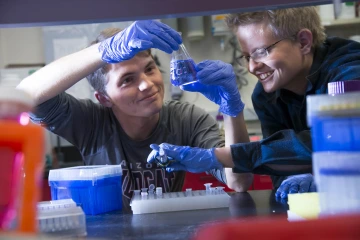COM-T Receives Approval for Bachelor of Science in Medicine
Undergraduate students interested in various health care professions will have a new degree option through the College of Medicine – Tucson.

University of Arizona Health Sciences students will be able to take advantage of expanding employment opportunities and meet the increasing demand for trained health care professionals through a new Bachelor of Science in Medicine degree program.
The University of Arizona Health Sciences recently received approval to offer a new Bachelor of Science in Medicine degree to College of Medicine – Tucson undergraduates that is targeted to begin as early as this fall semester.
Employment growth in the health care sector is expanding month over month according to the U.S. Bureau of Labor Statistics’ Current Employment Statistics, with projections of job growth exceeding 30% for the next 10 to 20 years.

Kevin Moynahan, MD, FACP, says the new bachelor’s in medicine will allow students to immerse themselves in the health care field earlier in their educational journeys.
The four-year degree program is designed and delivered as a collaboration between clinicians, basic scientists and humanists, with a focus on clinical reasoning and case-based learning. Graduates will be well prepared to enter careers directly in health care support positions; enter advanced degree programs such as medicine, nursing, physical or occupational therapy, pharmacy, and physician assistant; or pursue alternative health care-related careers including medical marketing, medical technology, medical law, biomedical engineering, medical business, medical administration and more.
The multi-disciplinary degree program involves collaboration with UArizona programs in engineering, life sciences, applied sciences and technology, social and behavioral sciences, humanities, nutritional sciences, nursing, pharmacy and public health. Faculty involved in design and oversight of the program are clinicians and basic scientists who contribute significantly to professional programs at UArizona Health Sciences, especially medicine. This faculty expertise ensures that the program is and will remain carefully tailored to meet the needs of students seeking entry into professional health care programs or careers.
Kevin Moynahan, MD, FACP, professor of medicine and vice dean of education at the College of Medicine – Tucson, talked to Health Sciences Connect about the new Bachelor of Science in Medicine and its role in student education.
Q: Why is there a need for a Bachelor of Science in Medicine?

Students will gain human medical science knowledge and clinical reasoning skills in four areas of emphasis: medical technology; basic medical sciences; medicine and society; and integrative and practice-focused medicine.
A: It's really about expanding the options that students have to pursue a degree in health-related professions, including medicine. We are trying to attract students from a wide diversity of different backgrounds, and these days, we find that students are hungry to understand different kinds of educational experiences they can enroll in to: one, learn about health professions and medicine; two, assess at an earlier stage if this is the right career for them; and three, potentially be prepared for some of the concepts that they're going to get in medical school, above and beyond the typical prerequisites.
We are hoping to attract a different kind of student who looks at this as a new opportunity to get involved at an earlier stage in the health profession and learn about some of the options while they're an undergrad.
Q: How will the bachelor’s degree in medicine fit in with the College of Medicine – Tucson’s other undergraduate degrees, such as physiology?
A: Physiology is a discipline that has wide application, and while becoming a health professional is one of the opportunities to pursue with that degree, it's not the only one. There are plenty of physiology majors who aren't going to enter the health professions field.
We are going to be coordinating our efforts with other very important undergraduate programs like physiology to ensure that students understand which of these programs is going to be the best for them. We're not just going to be funneling students who want to be doctors into this program; it's got to be the right fit. That's going to be something that's going to take a lot of our time and effort to get right, so that students understand which degree is better for them. Some of our courses will be taught by practicing physicians that will give them the pros and cons of being a physician versus alternative careers in medical care.
Q: How will this new degree benefit students who do want to continue on to medical school and become physicians?
A: There are going to be courses taught by physicians on ethics and professionalism of medicine, for example. Where else do you get that in your undergraduate coursework? You don't. These students, should they choose a career in medicine, will already have an understanding of some of the underpinnings of our profession, and I think that will help with their professional identity formation as they enter medical school.
Going from an undergraduate student and maturing into a physician over four years is a journey, and it's not an easy journey. I believe that these students who are starting that journey early, should they choose to go to medical school or another health professional school, will have a better understanding and potentially a less difficult time adjusting to some of the expectations of being a medical student.
Q: What are some of the challenges the College of Medicine – Tucson will face as the new bachelor’s degree in medicine program begins?
A: I'm really excited that this could be really big and grow rapidly, because there just aren't a lot of these kinds of degrees that are mainstream and none that are attached to a medical school. I think our challenge will be making sure that growth is controlled to make sure that we give students a high-quality experience. For example, we expect that a good number of these students may want to be part of the Honors College as well, and so we will make sure that we can work that into this program for those students.
The bachelor’s degree in medicine also is going to be an option for some of our new admission processes, such as the Accelerated Pathway to Medical Education program – our new seven-year program to a medical degree. We're going to try to integrate this new degree as much as we can with some of the other programs we already have in place.

